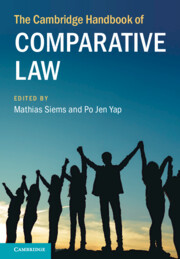Book contents
- The Cambridge Handbook of Comparative Law
- The Cambridge Handbook of Comparative Law
- Copyright page
- Contents
- Figures
- Tables
- Contributors
- Preface
- Abbreviations
- 1 Introduction
- Part I Methods of Comparative Law
- 2 Traditional Methods
- 3 Historical-Jurisprudential Methods
- 4 Critical Methods
- 5 Culture and Comparative Law Methodology
- 6 Linguistic Approaches
- 7 Qualitative Fieldwork
- 8 New Institutional Economics
- 9 Empirical Methods
- 10 Machine-Learning Methods
- Part II Legal Families and Geographical Comparisons
- Part III Central Themes in Comparative Law
- Part IV Comparative Law beyond the State
- Index
4 - Critical Methods
from Part I - Methods of Comparative Law
Published online by Cambridge University Press: 26 January 2024
- The Cambridge Handbook of Comparative Law
- The Cambridge Handbook of Comparative Law
- Copyright page
- Contents
- Figures
- Tables
- Contributors
- Preface
- Abbreviations
- 1 Introduction
- Part I Methods of Comparative Law
- 2 Traditional Methods
- 3 Historical-Jurisprudential Methods
- 4 Critical Methods
- 5 Culture and Comparative Law Methodology
- 6 Linguistic Approaches
- 7 Qualitative Fieldwork
- 8 New Institutional Economics
- 9 Empirical Methods
- 10 Machine-Learning Methods
- Part II Legal Families and Geographical Comparisons
- Part III Central Themes in Comparative Law
- Part IV Comparative Law beyond the State
- Index
Summary
Critical comparative law, as we know it, defines itself negatively: it stands not for, but against something, that is, traditional comparative law. This state of affairs turns critique into a weak programme for it tends to polarise and polemicise the discussion on comparative law and its methods. Critique divides an ‘us’ (the avant-garde) against ‘them’ (the mainstream). This chapter argues for a paradigm shift, reconceptualising critique as an ethos: an attitude that requires the comparative lawyer to position and reposition her- and himself time and again towards the received methodological tools and themes currently in vogue. Consequently, critical comparative law cannot be identified with advocating a specific substantive proposition or method, yet constitutes a mode of reflection. In this chapter, the critical positional work revolves around the view on (comparative) law from beyond the Western world. It first provincialises and specialises critical comparative law and, on this basis, discusses critically the topics of legal relativism, decolonialism, and orientalism, using universal human rights as its core theme. An integrated excursus on ‘law as such’, finally, clarifies some long-standing critical issues in the triangle of truth, language, and the lifeworld of the comparatist.
- Type
- Chapter
- Information
- The Cambridge Handbook of Comparative Law , pp. 48 - 71Publisher: Cambridge University PressPrint publication year: 2024
- 1
- Cited by

